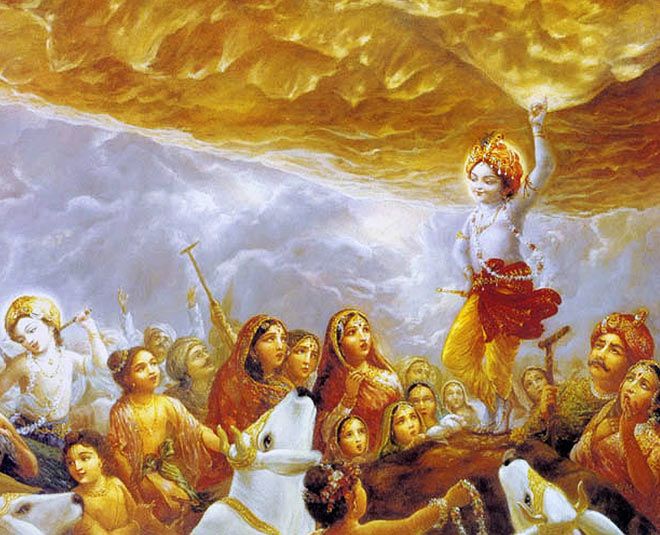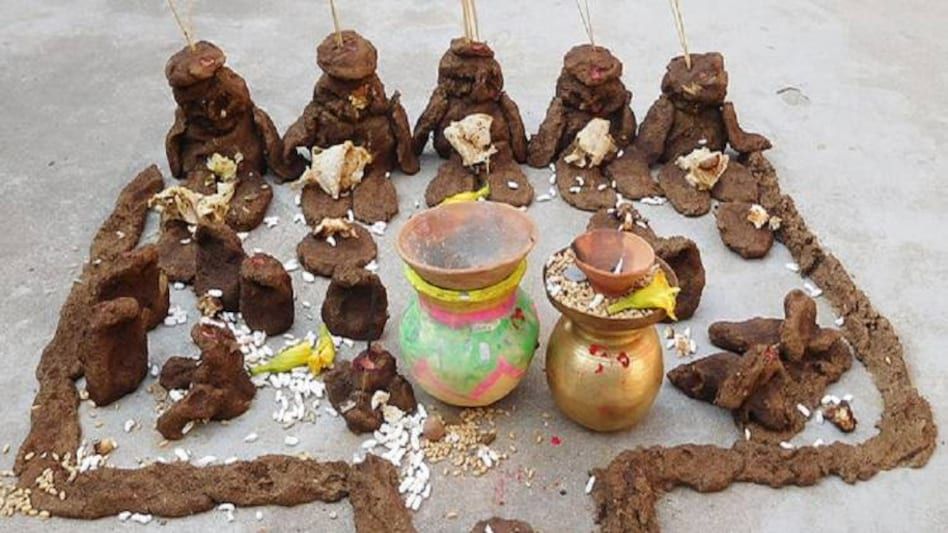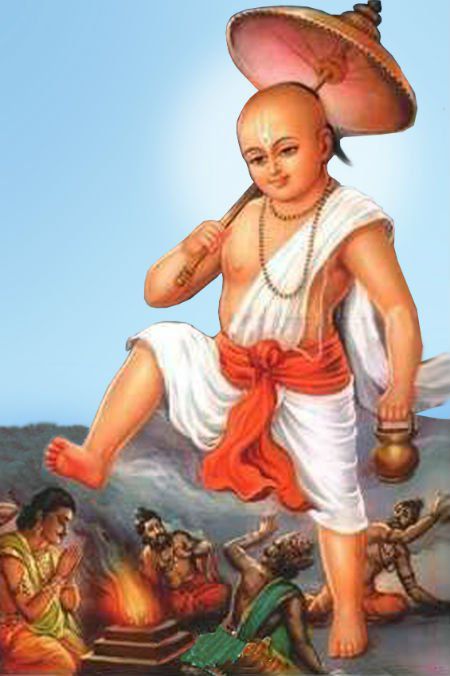🐄 𝑮𝒐𝒗𝒂𝒓𝒅𝒉𝒂𝒏 𝑷𝒖𝒋𝒂 🐄

Many of you must be thinking that Diwali is over. But no, its not. As we mentioned yesterday, Diwali is the festival of five days, and each day marks its own ambience. And the fourth day of Diwali embarks the gratitude one should always have for the mother nature.
On the auspicious occasion of Govardhan Puja or Bali Padwa, we at FamiliaDeYUDKBH wishe you all a very gracious Govardhan Puja.
"Har khushi aapke dwaar aaye,
Jo aap maange, usse adhik paayein..
Govardhan Puja mein Krishna gun gaayein,
Aur yeh tyohaar, khushi se manaayein.."
We all, irrespective of our culture, have listened to the stories of Krishna since our childhoods. The stories which give us the resemblance of Krishna being Ornery, Prankster, Altruistic, Beloved and Philanthropic. And one such story tells us about his Altruistic nature. The story of Govardhan.
This story is heard by most of us and to commemorate the Tale of the Govardhan Parvat and Baal Krishna, the festival of Govardhan Puja is celebrated every year on the first lunar day of
Shukla Paksha in Hindu Calendar month of Karthik. It started from Brijbhoomi and gradually became prevalent throughout India.

"Every festival comes with the incentive for celebrating it and that incentive always vouchsafes us new perspectives towards life."
The origin of the Govardhan Puja is described in Bhagwat Purana. During the autumn season, people of Braj
used to pay homage to the Hindu Lord of rain and storm- Lord Indra. However, Lord Krishna suggested against it, stating that Govardhan Mountain should be worshipped instead as it provided numerous natural resources for the livelihood to the dwellers of Braj. The citizens of Braj agreed to follow the same which infuriated Lord Indra. In the fury of getting replaced, he caused heavy rain and storms for over a week in Braj, resulting in heavy floods. Lord Krishna, to save his people and to break the pride of Indra, raised the giat Govardhan Mountain, or Parvat as they say, on his little finger for seven days straight, and protected the people of Gokul from Indra. Because of this, Indra had to accept his defeat and stop the rains and storms ignited by him. After the incident, Krishna was also given the name "Giridhari", the one who can carry mountain.
It is believed, that after the victory of Lord Krishna, he assumed the form of the mountain and accepted the Chhapan Bhog (a 56-food item meal) offered to him by the people of Braj.

Since then, the day is celebrated as Govardhan Puja on the day of Kartik Shukla Pratipada to worship the Govardhan Parvat. Since then, the practice of Govardhan Puja continues to this day, and every year the festival is celebrated with full zeal and zest. Little Krishna's magical lesson taught Indra the hard lessons of life. Ego, anger, pride and hatred will invite only
sufferings. One cannot earn respect and love by force and compulsion. It's a reward one earns by showing humility and sincere love.
The festival is a reminder to renew one's faith and seek refuge in the divine. It also teaches one to value the importance of nature and offer gratitude and respect to it. Govardhan Puja is celebrated by worshipping and supplicating Lord Krishna. Cereals like wheat, rice, and curry of gram flour and leafy vegetables are supplicated to the deity. On this day, the Govardhan hill is also worshipped by making hillocks of cow dung. Moreover, some devotees make a miniature idol of Lord Krishna, decorate it with seenkh, candles and diyas and worship it. Women on these days commonly observe day-long fasts.

Generally in Maharashtra, Gujarat, Karnataka the fourth day of Diwali is observed as "Bali Pratipada" or "Bali Padwa". As per the legends associated with "Vamana Avatar of Lord Vishnu", Asura king Bali who was well known for his bravery, uprightness and dedication to god Vishnu, announced that he will
perform Yajna (homa sacrifices) and grant anyone any gift they want during the Yajna. Lord Vishnu took the avatar of a dwarf Brahmin called "Vamana" and approached Mahabali. The
Vamana asked for property right over a piece of land that measures "three paces". When Mahabali agreed, Vamana grew to enormous proportions, metamorphosing into the Trivikrama
form, and covered everything Mahabali ruled over in just two paces. For the third pace, Mahabali offered his own head to Vishnu. Demon King Bali was pushed to Patala by Lord Vishnu. However, due to the generosity of the king Bali, Lord Vishnu granted him a boon that he could return to earth for one day in a year to be with his people, be worshipped and be a future
Indra.
Bali Pratipada commemorates the annual return of King Bali to earth and the victory of Vamana over Mahabali and all asuras. The rituals observed on the Bali Pratipada day have variations from state to state. In general, on
this festival day, Hindus exchange gifts, as it is considered a way to please Bali and the gods.

After the ceremonial Oil Bath, people wear new clothes. The main hall of the house or the space before the door or gate is decorated with a Rangoli or Kolam drawn with powder of rice in
different colours, thereafter Bali and his wife Vindhyavali are worshipped. Some build Bali icons out of clay or cow dung. In the evening, as night falls, door sills of every house and temple are lighted with lamps arranged in rows. Community sports and feasts are a part of the celebrations. It's also called 'Gujrati New Year.'
While in Punjab, Haryana, Uttar Pradesh and Bihar, on this day, the cows and calves are bathed, draped in clothes and flower garlands and vermilion/turmeric powder is applied on their foreheads. In some villages people make cows and calves of mud, dressing them and adorning them as such, symbolically. Aartis are performed. Wheat products, gram and Mung bean
sprouts are then fed to the cows, symbolizing the sacred cow Nandini, on earth, who was the daughter of Kamadhenu, and lived in Sage Vasishtha's ashram. The whole ritual is performed to show gratitude, as cows are symbolic to motherhood and chief source of livelihood.

We believe that these festives tell us to be grateful towards nature and to be a helper for others just as Lord Krishna.
And here is a small poetry to let you all know how you can do so..
"Be the person who knows to gives, to become Govardhan,
Be the person who expects nothing in return.
Be the person who saves others from the rain of sorrow, to become Krishan,
Be the person who expects their happiness in return.
Be the person who is selfish, to become the oxen,
Be the person who expects their love in return
Be the person who knows humanity, to become the real human,
Be the person who expects togetherness in return."
━◦○◦━◦○◦━◦○◦━◦○◦━◦○◦━◦○◦━
𝙲𝚘𝚗𝚝𝚎𝚗𝚝 𝙱𝚢: Have_faith_in_GOD
𝚀𝚞𝚘𝚝𝚎𝚜 𝙱𝚢: Have_faith_in_GOD
𝙴𝚍𝚒𝚝𝚒𝚗𝚐 𝙱𝚢: pahul_gpk
𝙱𝚊𝚗𝚗𝚎𝚛 𝙱𝚢: BooktrovertMe
Bạn đang đọc truyện trên: Truyen247.Pro